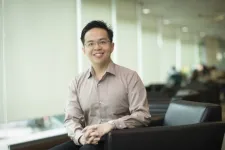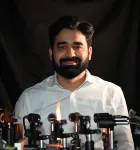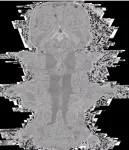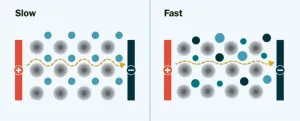(Press-News.org) By Alistair Jones
SMU Office of Research & Tech Transfer – Despite hero moments in movies where fingers clatter at dizzying speed across computer keyboards, not everyone in the real world finds code fascinating, nor algorithms intriguing.
In fact, there is a worldwide shortage of skilled data scientists and software engineers.
David Lo, a Professor of Computer Science at Singapore Management University (SMU), suggests two reasons for the shortfall.
“First, software today is everywhere; organisations, companies, governments and society rely on software,” he says.
“There is increasing demand for new software and upgrades to existing software [which] translates to the demand for skilled software engineers.
“Second, technologies continue to advance at a rapid pace. We see new technologies such as blockchain, self-driving cars, IoT, drones, etc. This advancement increases the complexity of software systems built on top of these technologies.
“This complexity, in turn, increases the demand for software engineers with the necessary skills to handle the different technologies and their interactions. With the rapidly increasing demand for skilled software engineers and the not-as-rapid increase in the number of newly trained software engineers, there is a shortage,” Professor Lo says.
New technical support is on the way in the form of TrustedSEERS, a research project led by Professor Lo, which has recently been awarded a National Research Foundation (NRF) Investigatorship grant. The NRF Investigatorship is designed to support a small number of excellent Principal Investigators with a track record of research achievements that identify them as leaders in their respective fields of research. Since the launch of the Investigatorship in 2015, Professor Lo is the second SMU faculty to have secured the grant.
An acronym for Trusted Software Engineering Expert AdvisoRs, TrustedSEERs will address the shortage of software engineers needed to create and maintain the software that society needs. It will do so by improving the workflow of software engineers and quality of software systems already in the field by creating trusted automation bots to act as concierges and interactive advisors – digital assistants informed by Artificial Intelligence (AI).
Evolving knowledge
The key to TrustedSEERS is software analytics (SA), a research area that has developed during the past two decades.
“SA seeks to automate software engineering tasks [and] has introduced novel and specialised AI-based solutions that analyse and learn from software engineers’ activity data (software artefacts). Much of such data is available on open-source software repositories such as GitHub,” Professor Lo says.
“SA's beginning was fuelled by the high availability of data in closed and open-source software repositories, the development of AI algorithms that make sense of data, and challenges that have plagued software development.
“Simply put, SA processes data to help address challenges faced by software developers and companies.”
One challenge is that software engineering knowledge is ever evolving, and engineers can struggle to keep up to date on the many different technologies.
“There is too much material and information to read. Outdated knowledge, wrong knowledge, or lack of knowledge can affect the quality of upgrades software engineers make to software systems,” Professor Lo says.
“SA can help software engineers by 'digesting' much of the data available in many repositories and making recommendations that can help software engineers in making constant, urgent and trusted upgrades to software systems and applications.”
Engineering data
Even though SA is a comparatively new field, it too needs to update. The TrustedSEERs project aims to bring about the next generation of SA to address mismatches and limitations that Professor Lo has identified in present solutions.
“Software engineers have high expectations of the effectiveness of SA tools’ recommendations before they are willing to adopt them,” he says.
“To boost effectiveness, many studies have predominantly focused on model-centric innovations by designing ever more sophisticated AI models that can crunch ever larger amounts of data – typically from a specific large data source.
“However, there is a limit on how much we can push forward by designing ever more sophisticated models and using ever larger (and noisier) data. Much more improvement can potentially be gained by focusing on data-centric innovations.”
Data-centric innovations involve engineering better data, but what does this entail?
“Better data corresponds to data that is more comprehensive (contains all helpful information and covers all essential cases), is relevant to a task at hand, is accessible (transformed to a representation that is more amenable to AI learning), and is labelled more consistently and accurately,” Professor Lo says.
“For engineering better data, there is a need for novel and effective solutions that can systematically select, label, synthesise, link and transform data from diverse software artefacts and harness them to learn effective SA solutions.”
Finding such solutions is a key focus of the TrustedSEERs project.
Intelligent and trustworthy
Also integral to the project is engendering trust in the automated bots it creates.
“Although trust has been highlighted as a critical component for effective human-machine collaborations, studies on investigating and improving the trustworthiness of SA solutions are limited,” Professor Lo says.
“Two sets of factors may affect a software engineer’s trust in an SA solution: intrinsic (the solution engenders trust by being able to provide explanations for its outputs); and extrinsic (the solution abides by regulations set by external authorities and is robust to external attacks). Both have not been addressed much in SA research.
“Current generation SA tools typically produce recommendations (such as, patches to fix a bug, source code to be written, or a third-party library to use) without explanations. The lack of explanations limits the trust that software engineers have in these recommendations and can hamper the adoption of SA solutions,” Professor Lo says.
The use of open-source software and crowdsourced data is widespread. But do we need to be cautious in trusting open-source software data?
“Yes. Many software artefacts are low-quality (they contain bugs and even security vulnerabilities) or outdated (they are using older technologies that are not optimal),” Professor Lo says.
“The SA solution that we want to build needs to be able to identify such low-quality and outdated data so that the output it produces does not introduce trustworthiness issues.”
The project, which will also consider privacy and copyright issues, aims to champion six new directions in data-centric and trustworthy SA.
“It will be a step towards my long-term dream of realising a symbiotic workforce of autonomous bots and engineers working together productively to build high-quality software for the betterment of industry and society,” Professor Lo says.
END
Realizing synergy for bots and engineers
2023-02-24
ELSE PRESS RELEASES FROM THIS DATE:
How the close dinosaurian relatives of birds evolved gigantic and miniature sizes
2023-02-23
An analysis of fossils of non-avialan theropod dinosaurs – a dinosaur clade that includes an array of body sizes – has provided findings that run contrary to expectations regarding the factors that inform the evolution of body size diversity. “Once quantified and analyzed in a phylogenetic framework [like this], we predict that diverse growth strategies will be recognized in other clades,” say the study’s authors. Over evolutionary history, many taxa have evolved very large and very small body sizes, and even closely related species can exhibit widely disparate sizes. ...
How does a person’s ethnicity impact their risk of death?
2023-02-23
In the UK, disparities in mortality risk factors exist between ethnic groups, with differences in overall mortality, top causes of mortality and individual mortality risk factors, according to a new study published this week in the open-access journal PLOS Global Public Health by I. King Jordan of Georgia Institute of Technology, US, and colleagues.
Despite the progress made in improving mortality rate, life expectancy, and disease survival outcomes in the last century, health disparities between various population ...
Plastic upcycling to close the carbon cycle
2023-02-23
RICHLAND, Wash.—There’s a lot of potentially useful raw materials bound up in used face masks, grocery bags and food wrap. But it has been much cheaper to keep making more of these single-use plastics than to recover and recycle them.
Now, an international research team led by the Department of Energy’s Pacific Northwest National Laboratory has cracked the code that stymied previous attempts to break down these persistent plastics. They reported their discovery in today’s issue of Science.
Low temperature and reaction control
Typically, recycling plastics requires ‘cracking’ or ...
Evolution of dinosaur body size through different developmental mechanisms
2023-02-23
The meat-eating dinosaurs known as theropods that roamed the ancient Earth ranged in size from the bus-sized T. rex to the smaller, dog-sized Velociraptor. Scientists puzzling over how such wildly different dinosaur sizes evolved recently found – to their surprise– that smaller and larger theropod dinosaurs like these didn’t necessarily get that way merely by growing slower or faster.
In a new paper published in Science, “Developmental strategies underlying gigantism and miniaturization ...
MoBIE enables modern microscopy with massive data sets
2023-02-23
High-resolution microscopy techniques, for example electron microscopy or super-resolution microscopy, produce huge amounts of data. The visualization, analysis and dissemination of such large imaging data sets poses significant challenges. Now, these tasks can be carried out using MoBIE, which stands for Multimodal Big Image Data Exploration, a new user-friendly, freely available tool developed by researchers from the University of Göttingen and EMBL Heidelberg. This means that researchers such as biologists, who rely ...
$3M NIH grant will fund next steps of research on dance and brain health
2023-02-23
WINSTON-SALEM, N.C. – Feb. 23, 2023 – Wake Forest University and Wake Forest University School of Medicine will receive $3 million over five years from the National Institutes of Health (NIH) to help researchers take the next steps in nearly a decade of research that indicates dance can promote cognitive health.
The grant funds a new study called IGROOVE that will help researchers determine what kinds of dance, the frequency of the dance classes and what aspects of the dance class – music, social interaction, cognitive challenge – affect fitness, memory and brain health.
The research will be co-led by Christina ...
UC Irvine researchers create E. coli-based water monitoring technology
2023-02-23
Irvine, Calif., Feb. 23, 2023 – People often associate Escherichia coli with contaminated food, but E. coli has long been a workhorse in biotechnology. Scientists at the University of California, Irvine have demonstrated that the bacterium has further value as part of a system to detect heavy metal contamination in water.
E. coli exhibit a biochemical response in the presence of metal ions, a slight change that researchers were able to observe with chemically assembled gold nanoparticle optical sensors. Through a machine-learning ...
New $2.9 million grant helps researchers address food insecurity for Hoosiers
2023-02-23
INDIANAPOLIS—With a $2.9 million grant from the National Institute on Minority Health and Health Disparities, researchers from Indiana University School of Medicine are working to improve food insecurity in Indiana and ultimately improve the health of people in Indiana.
Individuals who experience food insecurity–inconsistent access to affordable and nutritious food–are more susceptible to a variety of health conditions, including hypertension and Type 2 Diabetes. The FoRKS: Food Resources ...
On the road to better solid-state batteries
2023-02-23
A team from Lawrence Berkeley National Laboratory (Berkeley Lab) and Florida State University has designed a new blueprint for solid-state batteries that are less dependent on specific chemical elements, particularly critical metals that are challenging to source due to supply chain issues. Their work, reported recently in the journal Science, could advance solid-state batteries that are efficient and affordable.
Touted for their high energy density and superior safety, solid-state batteries could be a game-changer for the electric car industry. ...
National Center to Reframe Aging welcomes 16 to new advisory board
2023-02-23
The National Center to Reframe Aging — the nation’s leading organization dedicated to reshaping the conversation about older people — has established a new advisory board with 16 members from such diverse professional backgrounds as communications and public relations, research, policy, and law.
These board members were tapped to bring knowledge, strategic thinking, and interpersonal attributes to their role; to identify key organizations and decision-makers who can help advance the initiative; and support activities aligning with National Center project goals.
“We look forward to working with this talented group of advisors to grow ...






